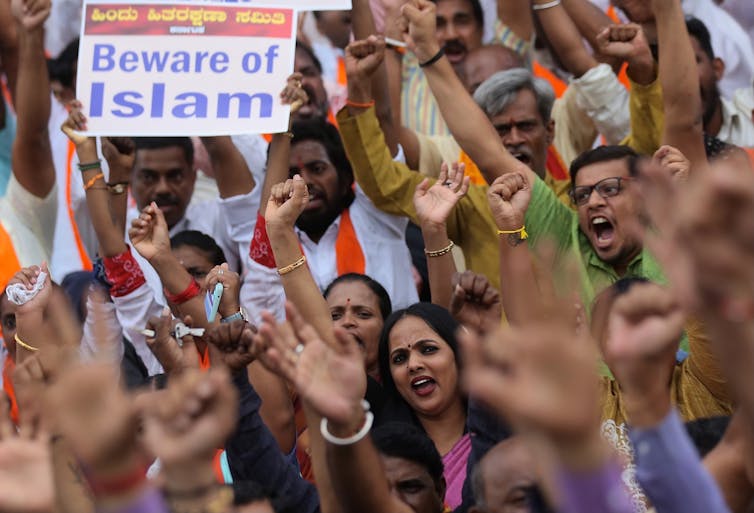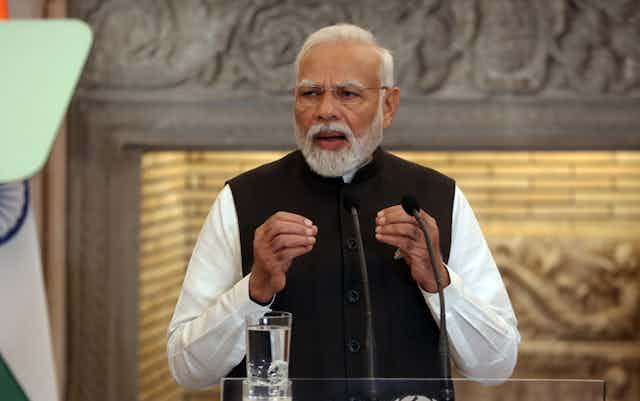The invitations to a state dinner to mark India’s hosting of this year’s G20 came not, as you’d expect, from the office of the president of India, but from the “president of Bharat”. This has prompted speculation from observers both at home and abroad about whether this signifies an official government intention to rename the country.
You can listen to more articles from The Conversation, narrated by Noa, here.
Some have suggested that the ruling BJP (Bharatiya Janata arty) is rattled, and is responding to the adoption of the acronym INDIA (Indian National Developmental Inclusive Alliance) by a group of more than two dozen opposition political parties ahead of the general elections in 2024.
There are numerous debates taking place online – both humorous and serious – about whether this name change ought to go ahead.
There’s a growing push among BJP MPs to adopt the name change, since “India” – the conventional English rendering of the country’s name – to some at least, symbolises “colonial slavery”. There have been previous petitions seeking such a name change, but these were dismissed by the Supreme Court in 2016, and again in 2020.
Just days before the G20 invitation went out, Mohan Bhagwat, head of the nationwide right-wing paramilitary organisation RSS (Rashtriya Swayamsevak Sangh) – the ideological parent of the BJP – called explicitly for the use of “Bharat” rather than India, saying: “We don’t have to think about whether anyone outside will understand this or not. If they want to, they will, but that is not our problem … The world need us today, we don’t need the world.”
Constitutional change
The recent flurry of speculation reopens old debates that were discussed and resolved in the Constituent Assembly in September 1949. Article 1 of the constitution, which deals with the name and territory of the Union, refers to the country as “India, that is Bharat”. In other words, the two names for the country have since always been understood as being synonymous. So the proposed change would mean altering the constitution to remove the reference to “India”.
Adding to the mix is the fact that a special session of the Indian parliament has been called for September 18-22, thus fuelling speculations that this in on the order of business.
But it’s unlikely that the path to the name change will be a formal one in the first instance. Like many significant changes that accommodate long-held demands of the Hindu nationalist right-wing in India, any name change will probably need to follow a process of societal normalisation.
For example, take the decision in April 2023 to remove from school textbooks references to the (Muslim) Mughals who ruled over the subcontinent between the 16th and 19th centuries. The push for this began to gain momentum in 2016 with the informal #DeleteMughalsFromHistory hashtag in 2016.
So the G20 dinner invite is merely an opening gambit in a longer play.
Rise of the Hindu right
Part of the rationale offered by supporters of the name change is that Bharat is an indigenous term that goes back in history and was prominent in the anti-colonial struggles – for example, the slogan “Bharat Mata ki Jai” (Hail to mother Bharat). But there are other more important political ideological factors that must not be missed.

As the backbone of the right-wing in the country, the RSS (founded in 1925) has always carried a vision for India as a Hindu nation that extends far beyond electoral politics. In this transformation of Indian society and polity, the idea of “othering” non-Hindus has been crucial, and at various times has targeted Muslims, Christians, non-Brahmins, secularists, atheists, dissenters and so on.
So the proposed change of name from India to Bharat is not an anti-colonial move. Rather it is the creation of a binary designation whereby those who continue to espouse an “Indian” identity will, over time, become politically labelled as an “other” to the true and authentic “Bharatiya” (resident of Bharat) who is the “ideal” Hindu or Hindu-ised citizen.
In my 2017 analysis of the rise of the right in India, I outlined the strategic ways in which the right relies upon contradictory leveraging of various dualities. One that I identified was India versus Bharat.
The Hindutva, or political Hindu right-wing vision of India cherished by the RSS and BJP, is one where Bharat stands not just for a country that is India, but also connotes an idyll of pure Hindutva morality.
The right is seeking to create a new wedge between those who live in India and those who live in Bharat. Much like the divide between Remainers and Leavers in the UK is a legacy of Brexit, this kind of divisive politics has long-term consequences as the meanings attached to specific terms are altered.
The entities Bharat and India are constructed for particular political purposes. The RSS chief Mohan Bhagwat said in 2013: “Rapes do not happen in Bharat, they happen in India.”
But facts matter little in the face of politically charged ideologues. Contemporary India is marked by a politics of distraction, where the recovering of some idyllic past is used by the right to obscure from view the failures of the present when it comes to equal rights and freedoms for citizens, competitive politics and the rule of law.
For citizens in need of life and livelihood security, a renamed Bharat is a hollow promise trading on manipulated narratives of past glory.

